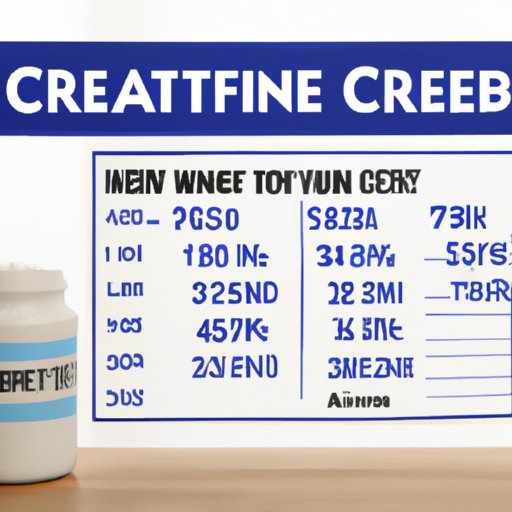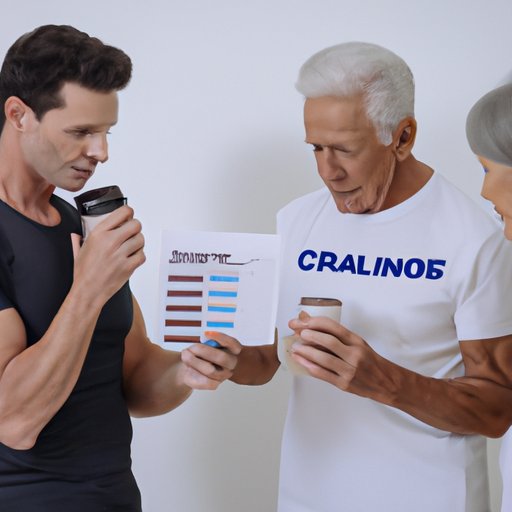Introduction
Creatine is a naturally occurring substance found in muscle cells that helps provide energy for physical activity. It’s one of the most popular dietary supplements used by athletes, bodybuilders, and others looking to improve their performance. But how old should you be before taking creatine? This article will explore the potential pros and cons of taking creatine at different ages, as well as the advice of health professionals on creatine use and its effects on different age groups.
Examining the Research: Is Creatine Safe for Young People?
When it comes to taking creatine, it’s important to consider the potential risks associated with it. While research has shown that creatine is generally safe for adults, there is limited evidence on its safety for young people. To better understand the potential risks, let’s look at some of the studies that have been done on creatine use by age.
One study published in the journal Nutrients examined the effects of creatine supplementation in adolescent athletes aged 12–18 years. The researchers found that taking creatine had no adverse effects on the participants’ health or performance. However, they did note that further research is needed to determine whether creatine is safe for long-term use in adolescents.
Another study published in the journal Sports Medicine looked at the effects of creatine supplementation in young athletes aged 6–14 years. The researchers found that while taking creatine was safe and effective for improving performance in these athletes, they caution that more research is needed to determine the potential long-term effects of creatine use in this age group.
These studies suggest that while creatine may be safe to take in the short-term, there is still a need for more research to determine the potential long-term risks associated with taking it at a young age.

A Breakdown of the Recommended Age to Take Creatine
When it comes to deciding whether to take creatine, it’s important to consider the guidelines from health organizations. The American College of Sports Medicine recommends that creatine supplementation should not be used in individuals younger than 18 years of age. Similarly, the International Society of Sports Nutrition advises that creatine should not be taken by children or adolescents under the age of 18.
It’s also important to consider other factors when deciding whether to take creatine at a younger age. For example, the type of sport or activity being participated in, the individual’s current health status, and any existing medical conditions should all be taken into account. Additionally, it’s important to remember that creatine is a supplement and not a substitute for proper nutrition and exercise.
Discussing the Advice of Health Professionals on Creatine Use by Age
When it comes to taking creatine, it’s always best to consult with a doctor first. A doctor can help assess an individual’s current health status and advise on whether taking creatine is the right choice. It’s also important to seek professional medical advice if any side effects are experienced while taking creatine.

Looking at the Effects of Creatine for Different Age Groups
When it comes to the effects of creatine, it’s important to consider the potential benefits and risks for different age groups. Generally speaking, the main benefit of taking creatine is improved athletic performance. Studies have shown that taking creatine can increase strength, power, and endurance, which can be beneficial for athletes of all ages.
In terms of potential side effects, the most common ones reported are gastrointestinal discomfort, dehydration, and muscle cramps. These side effects can be more pronounced in younger individuals, so it’s important to monitor them closely if taking creatine at a younger age.
Conclusion
When it comes to taking creatine, it’s important to consider the potential risks and benefits for different age groups. Generally speaking, health organizations recommend that creatine supplementation should not be used in individuals younger than 18 years of age. It’s also important to consult with a doctor before taking creatine, as they can help assess an individual’s current health status and advise on whether taking creatine is the right choice. Ultimately, the decision to take creatine should be based on personal preference and the advice of a healthcare professional.
(Note: Is this article not meeting your expectations? Do you have knowledge or insights to share? Unlock new opportunities and expand your reach by joining our authors team. Click Registration to join us and share your expertise with our readers.)
